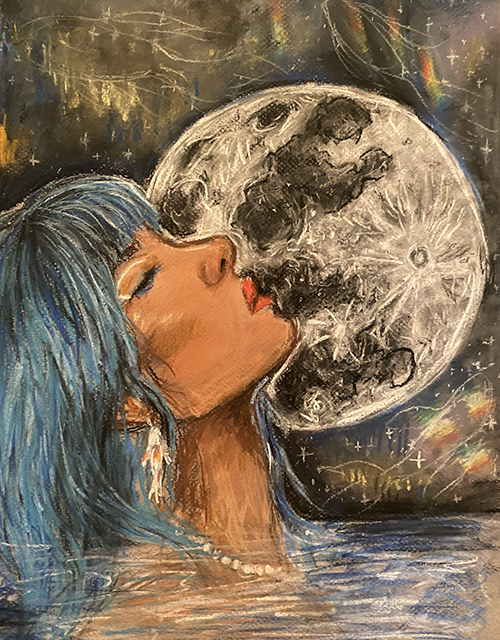Northwestern student Nia Robles Del Pino was named a 2024 Global Rhodes Scholar recently. The University’s 20th Rhodes Scholar, she also is the first Argentinian to receive the prestigious honor.
A senior in the Weinberg College of Arts and Sciences, Robles Del Pino majors in math and physics. And she is especially driven to inspire other underrepresented minorities to pursue STEM disciplines in high school and college.
She also has served as an undergraduate research assistant, participated in several student organizations, won essay contests and developed her artistic talents in painting and photography.
Right before the Nov. 21 Rhodes announcement, she took a few minutes to talk with Northwestern Now about her plans and her passions.
How do you want to make the world a better place?
A complete understanding of the universe, that’s what I’ve always dreamed of working toward since I was a teenager. There is so much we don’t understand about the building blocks of the universe that we need new physics to fill the gaps in our current most successful theories. My goal is to contribute to that effort through mathematical physics.
As a physicist, I also really want to advocate for underrepresented groups in STEM and make science more accessible to the people who have been told they “don’t look like a scientist.” Science permeates every aspect of our lives. And, as such, we need to strive for groups who have been excluded from these fields for years to have a space as well, and to make that space welcoming. I had to face many challenges to get where I am, and I hope to make it better for others who want to follow a similar path.

Self-portrait of Nia Robles Del Pino.
How did you develop an interest in these disciplines?
Funny enough, when I was in high school, I didn’t really enjoy math. It wasn’t until I took my first physics class when I was 15 that I started liking it. I was fascinated by mechanics and how math could model the behavior of elevators or throwing an object at an angle. At that time, I started participating in my high school astronomy department. I wanted to learn as much as I could, so I continued to research topics in physics and astronomy, watching documentaries and reading articles about black holes, the evolution of the universe and even string theory.
At Northwestern, I continued to explore different areas of physics and even pure math, which made me realize I wanted to become a theorist. The topic that really caught my interest was the idea of quantum gravity and cutting-edge theoretical work, developing new physics like Newton, Einstein and Dirac did back in the day.
What is a common thread that runs through your research so far?
One of my favorite books, “Rayuela” by Julio Cortázar, describes one of the characters as a “microcosmo.” That concept fascinated me because I think it really summarizes how I perceive the world.
Looking into archives of Indigenous works or studying the meaning of “Dreams as Indigenous Resistance” with Professor Kelly Wisecup gave insight on that universe, and it helped me learn a lot about myself and my own identity from my Indigenous Andean heritage. At the same time, with Professor John Joseph Carrasco, I’m able to study quantum field theories, the most fundamental particles that compose our universe — or a universe with more symmetries or more dimensions — and how they behave at high energies.
What brings you enjoyment?
A lot of things! Working on exciting research. Talking and spending time with my friends and my mom. Having time to dance or go to the lake and sketch or take long walks. When I was young, I went through a lot of difficult things that I really wouldn’t wish on anyone. I get really happy when I can look back from here and say, “You made it so far,” knowing that, in the end, everything will be okay.
What do you envision for your future?
I want to become a full-time faculty researcher at an academic institution. As much as I love physics and learning, I hope to be a professor and a mentor for students. I’d like to reach places in Latin America and help students — especially of low-income and Indigenous heritage — access opportunities to study physics. But it’s all a dream right now, and I haven’t figured out the details yet.
